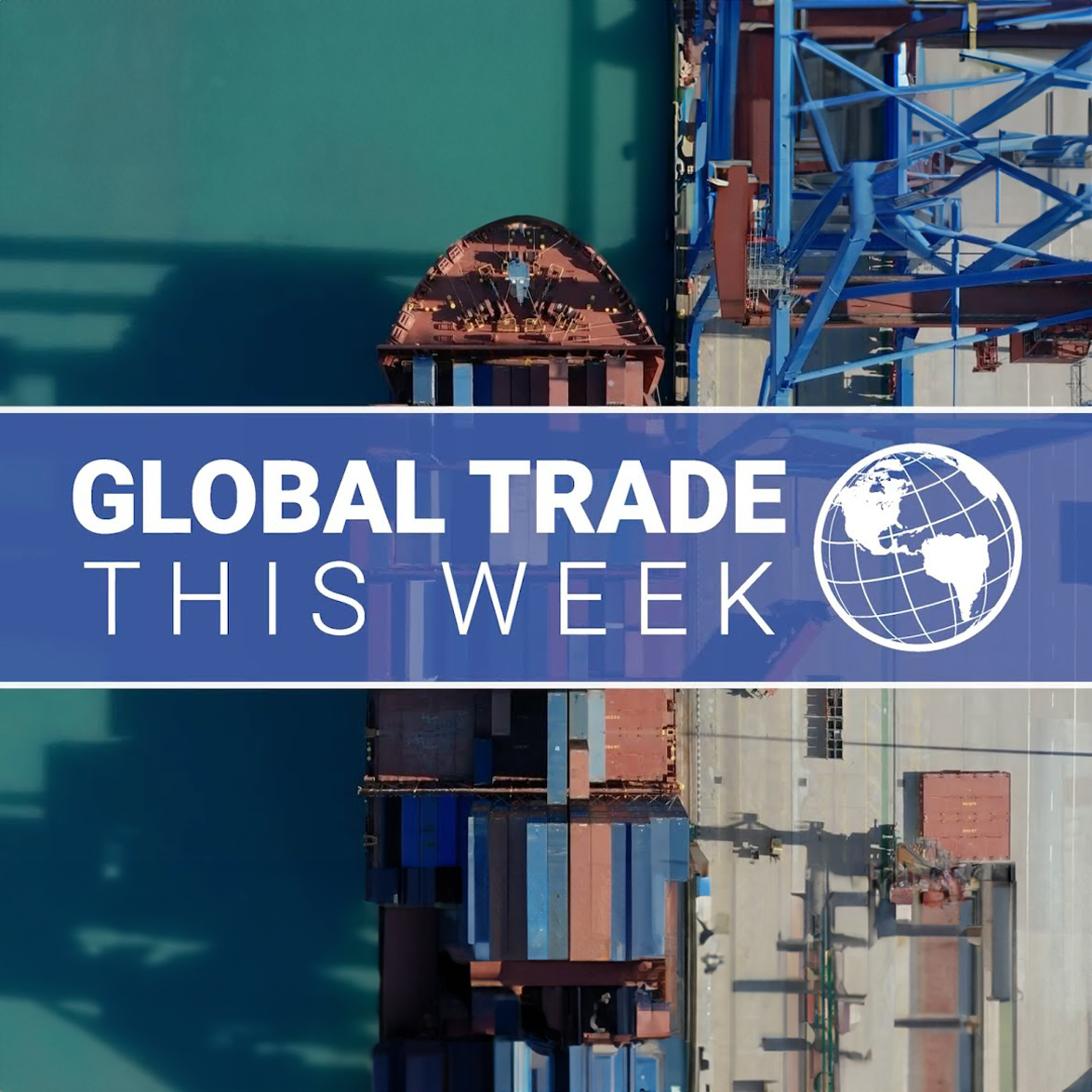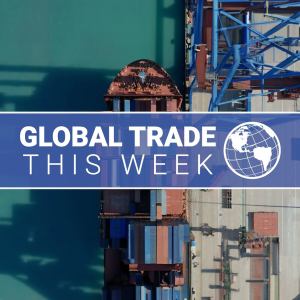
10.3K
Downloads
209
Episodes
Global Trade This Week is hosted by Pete Mento and Doug Draper, offering expert insights on global trade, supply chains, and economic trends. Each episode breaks down key issues affecting international commerce, providing valuable analysis for industry professionals.
Episodes

Monday Feb 06, 2023
Global Trade This Week – February 6th, 2023
Monday Feb 06, 2023
Monday Feb 06, 2023
What’s going on in Global Trade this Week? Today Doug Draper of Inland Star Distribution and Trade Geek Pete Mento of Mento LLC cover:
2:37 -Maersk & MSC’s 2M Alliance Break Up
12:10 -Halftime
25:05 -Earnings Calls Last Week
30:15 -ATA President Addresses Congress
https://www.capwwide.com/international-insights/2/6/23/gttw-podcast-february-6th-2023

Thursday Feb 02, 2023
Global Trade This Week – February 2nd, 2023
Thursday Feb 02, 2023
Thursday Feb 02, 2023
What’s going on in Global Trade this Week? Today Doug Draper of Inland Star Distribution and Trade Geek Pete Mento of Mento LLC cover:
1:50 -Is Doug Wrong About Drones?
8:58 -Trade Enforcement is Hard - Especially Understaffed
14:38 -Halftime
25:25 -Final Delivery Distruption
32:04 -Cyber Attack Lawsuits
https://www.capwwide.com/international-insights/2/2/23/gttw-podcast-february-2nd-2023
https://www.youtube.com/watch?v=R2H54vKTIV0

Tuesday Jan 24, 2023
Global Trade This Week – January 24th, 2023
Tuesday Jan 24, 2023
Tuesday Jan 24, 2023
What’s going on in Global Trade this Week? Today Doug Draper of Inland Star Distribution and Trade Geek Pete Mento of Mento LLC cover:
3:10 -Temp Controlled Cargo Growth Despite Lack of Investment
9:47 -Rail Industry Concerns for 2023
16:34 -Halftime
28:35 -Mexico’s Drug War and Impacts. What Can Be Done?
34:41 -Warehousing Lease Costs
https://www.capwwide.com/international-insights/1/24/23/gttw-podcast-january-24th-2023
https://www.youtube.com/watch?v=j5UwbLP7gGQ

Tuesday Jan 17, 2023
Global Trade This Week – January 17th, 2022
Tuesday Jan 17, 2023
Tuesday Jan 17, 2023
What’s going on in Global Trade this Week? Today Doug Draper of Inland Star Distribution and Trade Geek Pete Mento of Mento LLC cover:
2:50 Flexport Lays Off 20%
14:40 -Halftime
23:55 -WEF 2023 Baby!!! What Can We Expect This Time?
28:31 - Regional Airport Expansion for Air Cargo
www.capwwide.com/international-insights/1/17/22/gttw-podcast-january-17th-2022v2
https://youtu.be/ObwCvOonPxA

Tuesday Jan 10, 2023
Global Trade This Week – January 10th, 2022
Tuesday Jan 10, 2023
Tuesday Jan 10, 2023
What’s going on in Global Trade this Week? Today Doug Draper and Trade Geek Pete Mento cover:
4:29 -Canada Still Top US Trading Partner ahead of Mexico
9:37 -Courts Consider an End to Non Compete Language
13:59 -Halftime
23:30 -China Signals Surge In Oil Demand
27:07 -Underground Warehousing
https://www.capwwide.com/international-insights/1/10/22/gttw-podcast-january-10th-2022
https://www.youtube.com/watch?v=g5Y7Ig5Kfoc

Friday Jan 06, 2023
Global Trade This Week – January 6th, 2022
Friday Jan 06, 2023
Friday Jan 06, 2023
What’s going on in Global Trade this Week? Today Doug Draper and Trade Geek Pete Mento cover:
4:08 -Chinese / Lunar New Year - Year of the Rabbit
9:45 -CH Robinson Whacks Bob B the CEO - What’s Next?
18:09 -Halftime
28:44 -Airfreight Overcapacity & FedEx’s Latest Move
33:21 -Is the Driver Shortage Over?
https://www.capwwide.com/international-insights/1/6/22/gttw-podcast-january-6th-2022

Tuesday Dec 20, 2022
Global Trade This Week – December 20th, 2022
Tuesday Dec 20, 2022
Tuesday Dec 20, 2022
What’s going on in Global Trade this Week? On this final episode of 2022, Doug Draper and Pete Mento make some new logistics predictions for 2023:
2:34 -US Economy Goes into a Correction, Not a Crisis & -We’ll See at Least One High Profile Logistics Bankruptcy
4:25 -There’s Going to be a lot of Overcapacity
7:45 -At Least One US Governor Declares War on Crime
9:55 -This Will Be the Year Pretender Cryptos (AltCoins) Tank
11:03 -Electric Vehicles Poised to Dominate Last Mile
13:23 -Russia Will be Forced to Negotiate
14:56 -Interactive Online Retail Explosion
19:23 -World Politics: 1.) Britain to Hold UnBrexit Referendum. 2.) Macron Resigns. 3.) Trump Sees Charges. 4.) Biden to be Impeached by Congress.
21:37 -Near Shoring and Reshoring will Gain Momentum
26:34 -Heavily Tax Then Ban Domestic Production of Meat
https://www.capwwide.com/international-insights/12/20/22/gttw-podcast-december-20th-2022

Wednesday Dec 14, 2022
Global Trade This Week – December 14th, 2022
Wednesday Dec 14, 2022
Wednesday Dec 14, 2022
What’s going on in Global Trade this Week? Today Keenan Brugh of CAP Logistics and Trade Geek Pete Mento of Mento LLC cover:
8:14 -China's Counter Chip Act
13:27 -Ocean Carriers Facing Heartburn
17:38 -Halftime
24:27 -Rail Strike Out
31:51 -Air Freight Capacity Signals
www.capwwide.com/international-insights/12/14/22/gttw-podcast-december-14th-2022

Tuesday Dec 06, 2022
Global Trade This Week – December 6th, 2022
Tuesday Dec 06, 2022
Tuesday Dec 06, 2022
What’s going on in Global Trade this Week? On this prediction review episode, Doug Draper and Pete Mento cover some of the many logistics predictions they got right this year, such as:
2:24 -Ocean Freight Costs & Congestion
3:48 -Food Delivery Services Did Flourish & Expand
6:44 -So Far, No Port Strike
7:56 -Not as much Pop Up Logisitcs as Predicted
10:25 -Halftime
20:04 -Major Port Closures Did Happen More & More
20:54 -Electrification of the Final Mile
23:27 - US China Relations Did Become More Tense
24:07 -Republicans Did Not Take Both House and Senate in Midterms
24:45 - Logistics as a Subscription Service? Didn’t happen.
26:10 - Russia DID Invade Ukraine Q1 2022
https://www.youtube.com/watch?v=H4-syAxLXW4
https://www.capwwide.com/international-insights/12/6/22/gttw-podcast-december-6th-2022

Tuesday Nov 29, 2022
Global Trade This Week – November 28th, 2022
Tuesday Nov 29, 2022
Tuesday Nov 29, 2022
What’s going on in Global Trade this Week? Today Doug Draper of ACME Distribution and Trade Geek Pete Mento of Mento LLC cover:
7:05 -Zero-Covid Protests & Impact on Logistics
16:52 -Halftime
26:49 -Standarization of E-commerce Sales Tax?
33:35 -Forwarding Industry is Getting Aggressive
www.capwwide.com/international-insights/11/28/22/gttw-podcast-november-28th-2022
https://www.youtube.com/watch?v=adQZdq3n10U
